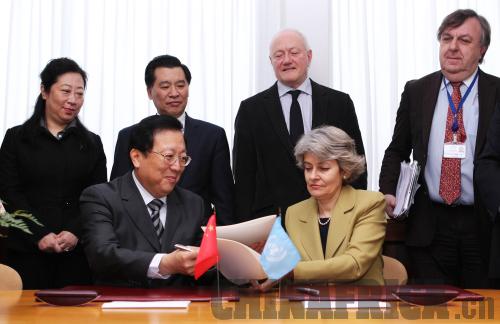|
 |
|
Irina Bokova, UNESCO Director General (Front Right) and Hao Ping, China's Vice Minister of Education (Front Left) (GAO JING) |
There is good news for African countries whose development has long been restricted by poor education. New options exist for funding of educational development projects.
On March 2, China and the UN Educational, Scientific and Cultural Organization (UNESCO) signed an agreement establishing an $8 million funds-in-trust to support educational development in Africa over four years, with a special focus on teachers.
These funds-in-trust will support Education for All, a top priority of UNESCO, and concentrate on teacher development in Africa. "This [teacher development] is where the greatest challenges rest," said Irina Bokova, Director General of UNESCO, while signing the agreement, who said she believed joint efforts between China and UNESCO will make a difference in this field.
Proposed at 1990 World Conference on Education in Jomtien, Thailand, the Education for All movement focuses on eliminating illiteracy, developing quality basic education and erasing gender discrimination in education.
Obstacles
A lack of teachers has threatened the realization of universal education in Africa. According to a projection by UNESCO Institute for Statistics released in October 2011, 2 million new teaching positions are needed worldwide. In Sub-Saharan Africa, teachers are in particularly short supply, with about 1 million vacancies. Factoring in attrition, Sub-Saharan Africa would need to recruit 350,000 new primary-level teachers per year to ensure that every child had access to quality education by 2015.
Ghana is a country in short of teachers. "One of the major challenges in Ghana was how to improve the quality of the public school system. To realize it, we have to invest a lot of money in terms of teachers' welfare to attract more qualified teachers," John Dramani Mahama, Vice President of Ghana, told ChinAfrica in a press briefing in Beijing when he visited China in April 2012.
Moreover, aid shortfalls could also jeopardize opportunities for 32 million African school-aged children, said a UN news report. According to an analysis of the Organization for Economic Cooperation and Development aid data by UNESCO's Education for All Global Monitoring Report, aid levels to basic education in Sub-Saharan Africa had dropped from $1.72 billion in 2007 to $1.65 billion in 2008. Taking into account the increased enrolment in primary schools, aid per pupil had dropped by 7 percent.
China's role
According to Hao Ping, China's Vice Minister of Education, these funds-in-trust are just a beginning.
Actually, China has long been supporting educational development in Africa through third parties like the UNESCO. In 2007, China offered $1 million to benefit the UNESCO International Institute for Capacity Building in Africa, based in Ethiopia, and the International Center for Girls and Women's Education in Burkina Faso.
In recent years, the education exchanges between China and African countries have been further strengthened.
According to the Sharm EI Sheikh Action Plan adopted at the Fourth Ministerial Conference of the Forum on China-Africa Cooperation (FOCAC) in Egypt in 2009, China formally launched China-Africa Universities 20+20 Cooperation Plan in 2010. Under the plan, 20 Chinese universities and 20 African universities have been selected to conduct long-term one-to-one cooperation so that they can have exchanges in their advantageous disciplines. Analysts believe this is an innovative way to further boost educational cooperation between China and Africa.
In addition to the 20+20 plan, China has also increased the number of scholarships awarded to African students to 5,500.
According to the Ministry of Foreign Affairs, China has provided 5,710 government scholarships to students from African countries during the academic years of 2010 and 2011, fulfilling the pledge of 5,500 scholarships two years ahead of schedule.
Latest statistics show that Ghana now has close to 500 students studying in China on government scholarships. "Most of them are studying in majors that are of urgent need in Ghana," said Vice President Mahama. |